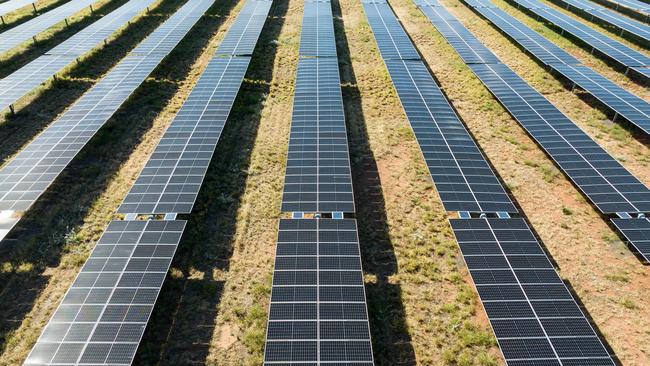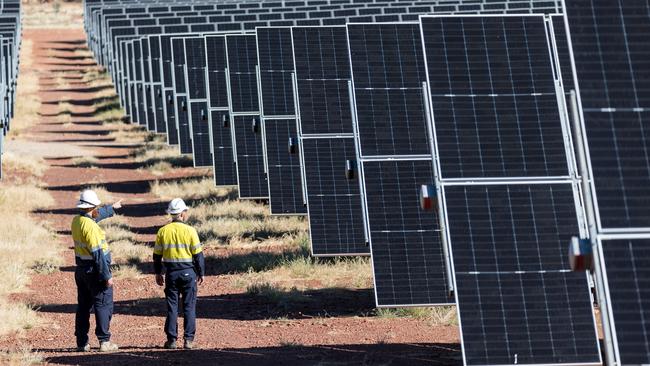Election 2025: ‘Social licence’ before green light for Queensland wind and solar farms
Proponents wanting to build big solar and wind farms in Queensland must first secure a ‘social licence’ from local communities, under new laws to be introduced in state parliament.

Queensland will make it tougher for big wind and solar projects to be built in the state, by forcing proponents to first publicly consult with residents and be granted a “social licence” by local councils.
In legislation expected to be introduced into state parliament on Thursday, proponents of renewable energy projects will have to consult with communities before they can apply for development approval.
The move by the Crisafulli government will see Queensland make it trickier for large renewables projects to be approved, after Labor governments in Victoria and NSW last year moved to fast-track approvals for green energy proposals in those states.
On Thursday, the government will also introduce legislation to override planning and environmental laws to ensure it is legal to build Brisbane 2032 Olympic venues, including the main stadium at Victoria Park which has been the subject of legal threats from opponents such as ex-LNP Premier Campbell Newman.
This month, Queensland Energy Minister and Treasurer David Janetzki confirmed the Liberal National Party government would repeal Labor’s legislated renewable energy targets, and keep the state’s coal-fired power stations open for longer.
Mr Janetzki insisted Queensland would still hit its emissions target of net zero by 2050, despite axing or overhauling two major pumped hydro projects and withdrawing state funding for the nation’s largest green hydrogen scheme. The change to Queensland’s planning laws for renewables projects will mean renewables proponents will have to conduct social impact assessments and enter into a “binding community benefit agreement” with a local council before lodging a development application.
It follows a resolution at last year’s Local Government Association of Queensland conference to improve regulation for large-scale renewables projects by ensuring there’s “proactive collaboration with councils” and that planning considers social, environmental and economic concerns of each region.

Deputy Premier Jarrod Bleijie said the reforms would be “nation-leading” and would give regional communities a voice on “solar and wind proposals in their own backyard” by mandating public consultation, as the LNP had promised during the October election campaign.
“Communities deserve not only to have a say but to have project benefits reinvested locally into roads and infrastructure, which is what these new laws will require,” Mr Bleijie said.
“Labor’s rush to renewables left communities in the dark and without a voice for too long, failing to give locals the chance to benefit from these major developments.
“These changes deliver our election commitment to make the approvals process a level playing field with the same rigorous requirements, including community consultation, regardless of the project.” In January, Mr Bleijie ordered a four-month pause on the assessment of three wind farm applications, to allow proponents to “demonstrate that the appropriate community consultation and impact assessment” had been undertaken.
Victorian Energy Minister Lily D’Ambrosio has estimated that $1bn in renewables projects have been fast-tracked since the government added the sector to its Development Facilitation Program last year.
“Renewable energy is the cheapest form of new-build energy available – that’s why we’ve cut red tape, making sure it can be built sooner, helping bring down power prices and create great new jobs for locals,” Ms D’Ambrosio said in February.
Late last year, the NSW government said it had developed a new renewable energy planning framework to spur faster planning decisions, and also introduced rules defining how far away from homes wind turbines needed to be.
The changes effectively removed the capacity of landowners to block renewable energy projects.
At the time, NSW Climate Change and Energy Minister Penny Sharpe said the government was working to “reduce barriers to investment”.
“Having a clear, transparent planning system will pave the way for a reliable and clean energy system,” Ms Sharpe said.





To join the conversation, please log in. Don't have an account? Register
Join the conversation, you are commenting as Logout